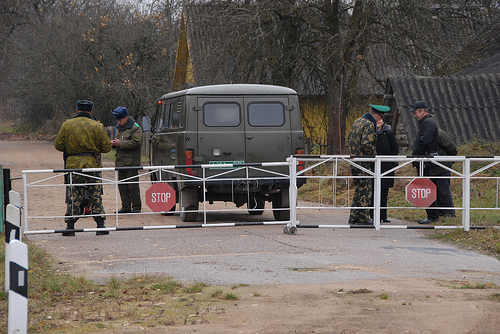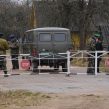
Belarus and Europe: What Next?
Publication: Eurasia Daily Monitor Volume: 9 Issue: 53
By:

There has been much speculation as to the next stage of the rift between Belarus and the European Union. In late February, the ambassadors of the 27 EU nations left Minsk in response to Belarusian President Alyaksandr Lukashenka’s request that the ambassador of Poland and the head of the EU delegation should return home for consultations. The prelude to this diplomatic spat was the decision by the Europeans to extend their travel ban to a further 21 Belarusian officials (mainly police and judges). The value of such sanctions was the subject of a debate in several quarters, including on the website of the Office for a Democratic Belarus (Belarus Headlines VI, February 2012).
Several analysts reached the conclusion that travel sanctions do not work effectively and are unlikely to bring the desired changes, first and foremost, the release of political prisoners. On the other hand, the reaction from Minsk was so spectacularly overboard that perhaps these conclusions need to be revisited. In addition to the departure of diplomatic personnel, evidence suggests that the Belarusian authorities have imposed an internal travel ban to prevent Belarusian oppositionists and those suspected of supporting sanctions from traveling to the countries of the European Union. On March 1, Pavel Radzivonau, the head of the department for investigating the legality of acts of the General Prosecutor of Belarus, reported that those supporting the introduction of sanctions against Belarus might face bans on leaving the country (Charter97.org, March 14).
On March 11, the two co-chairpersons of the Campaign for Fair Elections, Syarhey Kalyakin, leader of the Just World Party, and Viktar Karnayenka of the Movement for Freedom, were not allowed to cross the border from the Kammeny Loh checkpoint into Lithuania. Border guards took away their passports for inspection, but returned them without explaining why they were not permitted to cross. Four days earlier, the leader of the United Civic Party, Anatol Lyabedzka, had also been detained at the same checkpoint. Although he had acquired a foreign travel permit beforehand, it was peremptorily canceled without explanation (Naviny.by, March 11).
A few days later, Andrei Dynko, editor of the Belarusian daily newspaper Nasha Niva, one of two major newspapers of the opposition still permitted to operate in Belarus, was also prevented from crossing the border. He and others attribute the restrictions on travel to an alleged list of 108 opposition activists subject to a retaliatory travel ban (RIA Novosti, March 14). But, Dynko has never publicly supported sanctions against officials of the Belarusian government and at best could be accused of guilt by association. He was advised to go to the Office of Citizenship and Migration in his home area for an explanation. Others who have faced similar bans from leaving the country include the human rights activist Valyantsin Stefanovich and Alyaksandr Dabravolski of the United Civic Party (Naviny.by, March 14).
Closing borders to one’s own citizens raises the stakes considerably as there has been a longstanding dialogue and series of meetings between EU statespersons and Belarusian activists. It raises questions about the stability of the Lukashenka regime that has run into significant economic problems in a number of areas. In mid-March it raised prices once again for both sugar and gasoline (by 7.5 percent and five percent, respectively) (telegraf.by, March 14). Belarus reported zero growth in the last quarter of 2011, and inflation reached 108 percent in December 2011 (Financial Times, March 1). In a prequel to a forthcoming article in New Eastern Europe, Susan Corke and David J. Kramer maintain that Lukashenka has brought Belarus “to the brink of economic ruin” after nearly two decades in power. They outline a growing Russian takeover of banks and media outlets as Russia takes steps to prevent the economic collapse of Belarus (charter97.org, March 13).
The question usually raised in such circumstances is as follows: does intransigence on the part of the EU push Belarus directly into Russian hands? Should the Europeans turn a blind eye to human rights violations, torture and incarceration of oppositionists in order to prevent the “loss” of Belarus to the quasi-imperialist neighbor, now once again in the hands of Vladimir Putin?
But that picture is simplistic, because it is above all Lukashenka who has prevented Belarus from developing in a pattern that would have allowed it to benefit from its healthy economic position in the late Soviet era. State control, combined with lack of reform and any meaningful economic policy, has left the republic helpless between neighbors to the West that have opted for the EU route, and Russia to the east, where a rapacious state-sponsored capitalism is in place. Belarus has remained rooted to the spot even though Lukashenka’s advisors, past and present, have long recognized the need for deep reforms. Even the President appeared briefly to perceive an opportunity when former presidential candidate Yaraslau Ramanchuk, an economist, offered such a platform in the 2010 election.
Ultimately and predictably, no such program has emerged. The pact with the population – the so-called social contract – is defunct since the president has no recipe for economic relief. There will be no more subsidies, no cheap gas or oil – only loans with chillingly high interest rates. The problem is not the fault of Brussels; it is purely homegrown. Spending the 2009 IMF loan on wage and pension increases eliminated a further source of stabilization loans. Russia also is not a bottomless pit, as Jan Cienski has observed, and will not bail out Belarus indefinitely (Financial Times, March 1).
The key question, therefore, is not whether sanctions work, but how long Belarusians are prepared to continue with President Lukashenka. That he is in a state of angst is evident from the travel bans on his opponents. But what does he have to offer after almost eighteen years in power? The answer would appear to be: very little.




